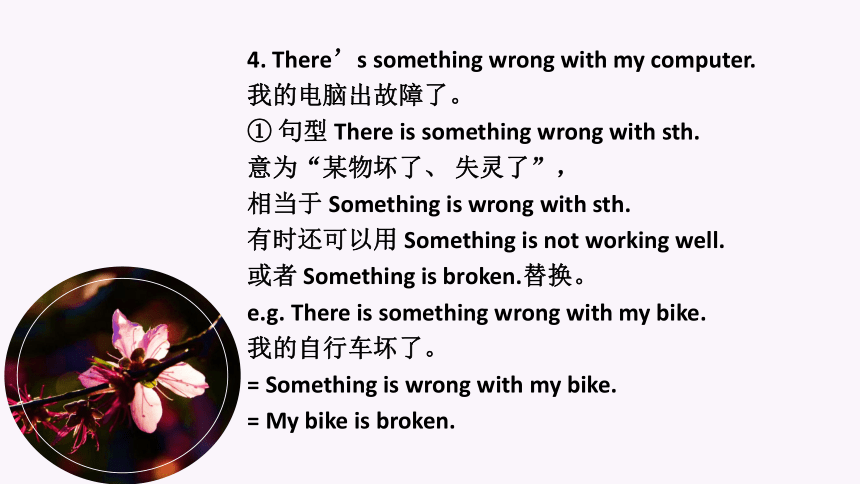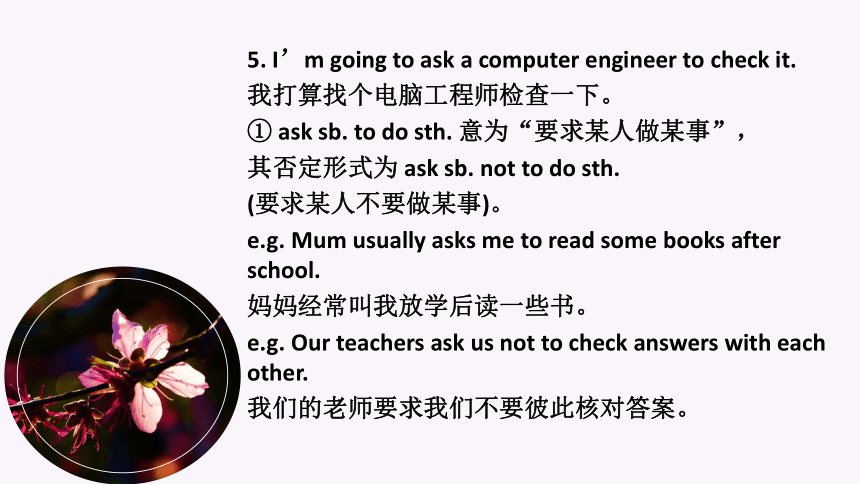牛津译林版英语七年级下Unit 2 Neighbours单元知识点(句子与语法) 课件(共49张PPT无素材)
文档属性
| 名称 | 牛津译林版英语七年级下Unit 2 Neighbours单元知识点(句子与语法) 课件(共49张PPT无素材) |

|
|
| 格式 | zip | ||
| 文件大小 | 3.3MB | ||
| 资源类型 | 教案 | ||
| 版本资源 | 牛津译林版 | ||
| 科目 | 英语 | ||
| 更新时间 | 2020-06-28 23:23:10 | ||
图片预览












文档简介
(共49张PPT)
Unit
2
Neighbours
句子与语法
目录\
Contents
语法:一般将来时
句子分析
Part
01
句子分析
1.Where
are
you
going????你要到哪儿去?
????go?可以用进行时态来表示将来的动作。如:
????He
is
going
to
Paris.??他要去巴黎了。
be
going
to
在此处为现在进行时表示将来。
现在进行时可以用于表示按计划或安排将要发生的动作,
常有“意图”“安排”“打算”
等含义。
go,
come,
leave
,
move等表示位移的动词,
都可以用现在进行时表示将来。
????如:Look!
The
bus
is
coming.???
看!公共汽车就快来了。
????I’m
leaving.
Bye!???我要走了,再见。?
????We’re
moving
to
Beijing.???我们就要看搬到北京去了。
I’m
going
to
visit
our
new
neighbours.???
????我打算去拜访我们的新邻居。
????be
going
to?表示将来,后接动词原形,be随主语而变化。
????be
going
to?句型一般指“经过计划安排之后准备做某事”。如:?
????Zhang
Hua
is
going
to
study
abroad
next
year.???
????张华明年准备出国留学。
????She’s
going
to
visit
Nanjing
this
summer.???
????这个暑假她打算游览南京。
2.
I’m
afraid
they
won’t
welcome
visitors
like
you.恐怕他们不会欢迎像你这样的客人。
①
visitor
可数名词,
意为“访问者,
参观者”,
多指交际,
商务,观光或者探望的访客。
e.g.
They
are
visitors
from
China.
他们是来自中国的访问者。
Many
visitors
come
to
China
to
visit
the
Great
Wall.
许多游客来中国游览长城。
以-or
结尾的表示人的名词有
actor
男演员
translator
翻译
inventor
发明家
②
like
介词,
意为“像”,
其反义词为
unlike
e.g.
The
old
man
cries
like
a
child.
这位老人像一个孩子一样哭了。
He
looks
like
a
visitor.他看起来像个游客。
辨析:
like
和
as
like
像….一样
用于相似关系,
即两者在形态上或者性质上有相似之处,
但并不等同;as
作为;
以…身份,用于说明同一关系,
即两者实为一体
e.g.
She
talks
to
me
like
my
mother.
她像我妈妈那样跟我说话。(她不是我妈妈)
She
talks
to
me
as
a
mother.
她以妈妈得身份跟我说话。(她是我妈妈)
3.They
help
us
with
all
kinds
of
problems.
他们帮助我们解决各种各样的问题。
①
help
sb.with
sth.
意为“对某人很有帮助”,
还可以说成
help
sb.(to
)do
sth.
意为“帮助某人做某事”
e.g.
I
like
helping
my
mother
with
the
housework.
我喜欢帮妈妈做家务。
=
I
like
helping
my
mother
(to)
do
the
housework.
②
all
kinds
of
意为“各种各样的”
,kind
可数名词,
意为“种,种类,
类型”。
同义词是
sort。
e.g.
There’re
all
kinds
of
animals
in
the
zoo.动物园里有各种各样的动物。
kind
可为形容词,
意为“亲切的,
仁慈的”
a
kind
old
man
一位和蔼的老人
be
kind
to
sb.
对某人友好
4.
There’s
something
wrong
with
my
computer.
我的电脑出故障了。
①
句型
There
is
something
wrong
with
sth.
意为“某物坏了、
失灵了”,
相当于
Something
is
wrong
with
sth.
有时还可以用
Something
is
not
working
well.
或者
Something
is
broken.替换。
e.g.
There
is
something
wrong
with
my
bike.
我的自行车坏了。
=
Something
is
wrong
with
my
bike.
=
My
bike
is
broken.
②
something
不定代词,
意为“某事,
某物”,
所用于肯定句中。
在否定句或者疑问句中常有
anything;
否定句中可用
nothing。
做主语时谓语动词用单数形式。
e.g.
Something
happens.
有事发生了。
I’d
like
something
to
eat.我想吃点东西。
5.
I’m
going
to
ask
a
computer
engineer
to
check
it.
我打算找个电脑工程师检查一下。
①
ask
sb.
to
do
sth.
意为“要求某人做某事”,
其否定形式为
ask
sb.
not
to
do
sth.
(要求某人不要做某事)。
e.g.
Mum
usually
asks
me
to
read
some
books
after
school.
妈妈经常叫我放学后读一些书。
e.g.
Our
teachers
ask
us
not
to
check
answers
with
each
other.
我们的老师要求我们不要彼此核对答案。
②
engineer
可数名词,
意为“工程师”,
其前的不定冠词用
an。
e.g.
My
father
is
an
engineer.
我父亲是一名工程师。
They
are
engineers
from
China.
他们是来自中国的工程师。
③
check
及物动词
,
意为“检查,
核实”。
e.g.
My
English
teacher
always
checks
my
homework.我的英语老师总检查我的作业。
Please
check
your
answers
with
your
classmates.
请和你的同学核对答案。
与
check
有关的短语:
check
in
登记
check
out
调查,
检查,
结账退房
6.My
cousin
Annie’s
bicycle
is
broken,
so
she’s
going
to
ask
someone
to
fix
it.?
我表妹安妮的自行车坏了,因此打算请人修它。
①句是由并列连词so?连接的并列句,so意为“因此;所以”。如:?
????Jack
was
ill,
so
he
didn’t
go
toschool.???
????杰克病了,因此没有去上学。????
②broken作形容词,意为“弄坏了的;伤残的”,broken?常用于器皿、玻璃、钟表等。如:?
????
????―What’s
the
time????
????―什么时间了??
―I
don’t
know,
my
watch
is
broken.??
????―我不知道,我的表坏了。?
????-I
think
the
doorbell
must
be
broken
????-我想门铃一定是坏了。
?
-I
didn’t
hear
anything.??
????-我没有听见任何声音。
③
someone
不定代词,
意为“某人”,
与
somebody
用法相同。
作主语是谓语动词用单数。
e.g.
Someone
wants
to
meet
you.有人想见你。
I
ask
someone
to
take
a
message
for
you.
我找人给你捎个口信。
Be
quiet!
Someone
is
here.安静!
有人在这里。
④fix
及物动词,
意为“修理,
安装,使固定”,与repair同义。如:?
????Can
this
computer
be
fixedhere????
????这台电脑可以修吗?
????I
must
get
the
MP5
fixed.???
????我必须找人把台MP5修理好。?
Uncle
Wang
can
fix
watches.
王叔叔会修手表。
辨析:
fix
与
mend
fix
修理
表示使受到一定损坏或失灵的东西恢复其性能或机能,
其对象范围很广,
从道理,
机器到日常用品。
mend
修补
表示修补破损的东西,
使其恢复原样,
一般指较小的物品。
e.g.
Tony
can
fix
bikes.
托尼会修自行车。
She
is
mending
the
clothes.
她正在修补衣服。
7.Some
college
students
are
ready
to
help.
一些大学生很乐于助人。
①
college
可数名词,
意为“学院”。
e.g.
They
all
want
to
go
to
college.
他们都想上大学。
My
elder
brother
is
a
college
student.
我哥哥是一名大学生。
be
in
college
正在上大学
go
to
college
上大学
e.g.
He
is
in
college.
他正在上大学。
She
is
going
to
college.她打算上大学。
②
be
ready
to
do
sth.
意为“准备做某事”
e.g.
He
is
always
ready
to
help
others.
他随时准备帮助别人。
I’ll
be
ready
to
leave.
我准备离开。
拓展:
be/
get
ready
for
意为“为…做准备”
e.g.
Please
get
ready
for
the
lesson,
boys
and
girls.
孩子们,
请准备上课。
8.
How
about
your
uncle
?你叔叔呢?
“How
about…?”
相当于“What
about…?
”,
常用于询问对方或
者第三者与情景有关的各种情况。
e.g.
I
am
going
to
the
cinema
this
evening.
How/What
about
you?
我打算今晚去看电影,
你呢?
This
white
shirt
is
twenty
dollars.
How/What
the
blue
one
over
there?
这件白衬衫
20
美元,
那边那件蓝色的呢?
9.That
sounds
like
a
good
idea.???那听起来像是好主意。
①sound用作连系动词,意为“听起来”。sound
like?意为“听起来像”。如:?
????That
sounds
good.???这话听起来很好。?
????How
sweet
her
voice
sounds!???她的声音多甜啊!?
????But
it
sounds
like
there
is
something
wrong
with
the
machine.???
????听起来好像这机器出了问题。?
????The
idea
sounds
like
fun.???这个主意听起来很有趣。
?
②That’s
a
good
idea.???适用于表示同意别人的建议。表示“那是个好主意。”如:?
????―Let’s
have
a
rest
and
find
something
to
eat.???
????―让我休息一下,找点吃的吧!?
????―That’s
a
good
idea.???
????―那是个好主意。?
10.Please
look
at
the
information
below.???
请看下面的信息。
?①information?是不可数名词,
意为“信息”,a
piece
of
information?意为“一条信息”。e.g.
We
can
get
much
information
from
the
microblog.
我们可以从微博上得到许多信息。
He
knows
a
lot
of
information
about
it.
他知道有关这件事的很多信息。
Can
you
give
me
any
information
about
the
meeting????
你能给我提供这次会议的信息吗?
②below用作介词,意为“在......以下”,
指处于比某物低的位置,
不一定在物体的正下方,
其反义词是
above。
e.g.
Write
down
your
name
below.
在下面写下你的名字。
Our
office
is
above
the
restaurant.
我们的办公室在餐厅的下面。?
At
night,
the
temperature
will
fall
below
zero
again.???
在夜里温度将又下降到零度以下。
?There
stands
a
chair
below
the
window.???
窗户下有一把椅子。
below用作副词,意为“在下面;向下”。如:?
See
the
note
below.???
看下面的注解。
The
officer
ordered
them
to
go
below.
军官命令他们下去。
拓展:
under
也可表示“在…下面”,
指处于某物的正下方,
其反义词是
over
e.g.
I
want
to
have
a
rest
under
the
tree.
我想在树下休息下。
There
is
a
light
over
the
table.
桌子上方有一盏灯。
11.Are
you
worrying
about
what
to
wear
to
a
party
or
how
to
design
your
home??
你正担心穿什么去参加聚会或如何设计你的家吗?
①worry不及物动词,意为“担心;发愁”,常与about连用,表示“为??而担心”。如:?
????My
parents
often
worry
about
my
maths.???
????我父母经常担心我的数学。
?worry作及物动词,意为“使……担心;使……发愁”。如:?
????His
carelessness
worries
me.???他的粗心叫我担心。
12.Are
you
worrying
about
what
to
wear
to
a
party
or
how
to
design
your
home??
你正担心穿什么去参加聚会或如何设计你的家吗?
①worry不及物动词,意为“担心;发愁”,常与about连用,表示“为......而担心”。worry
about
sb./sth.
“为某人/
某事儿焦虑/烦恼/担心,
担心某人/某事”。
e.g.
I
worry
about
my
father’s
health
very
much.
我很为父亲的健康担心。
Don’t
worry
about
her.
She
will
be
OK.
别为她担心,
她会好的。
My
parents
often
worry
about
my
maths.???
我父母经常担心我的数学。
辨析:
worry
about
与
be
worried
about
worry
about
强调“担心”
的动作
worry
为动词
be
worried
about
侧重“担心”
的状态
worried
为形容词
e.g.
Your
mother
will
worry
about
you.
你妈妈会担心你。
Mrs.
Brown
is
always
worried
about
her
son.
布朗夫人总是为她的儿子担心。
?worry作及物动词,意为“使……担心;使……发愁”。如:?
????His
carelessness
worries
me.???他的粗心叫我担心。
worry作形容词,意为“担心的;着急的”。如:?
????Don’t
be
worried
about
me
.
I
will
work
hard.???
????别担心我,我会努力的。,?
②what
to
wear
to
a
party?穿什么去聚会;
how
to
design
your
home如何设计你的家。
这里
what
to
wear
to
a
party
和
how
to
design
your
home
是“疑问句+不定式”
合在一起作
worry
about
的宾语。
e.g.
Do
you
know
what
to
do
next?
你知道下一步做什么吗?
I
don’t
know
how
to
use
the
washing
machine.
我不知道该怎样使用这台洗衣机。
拓展:
①
“疑问句+不定式”
结构中的疑问句词,
包括疑问代词
who
,what,
which
和疑问副词
how,when,where
等。
这些疑问词和不定式一起构成了不定式短语,
这种结构可在句子作主语,
宾语,表语等。
???e.g.
Please
tell
me
how
to
write
an
English
letter.
请告诉我如何写英文书信。(作宾语)
?I
don’t
know
how
to
get
there.???
?我不知道如何到那儿。
The
question
is
where
to
put
it.
问题是该把它放在哪儿。(作表语)
?The
question
is
where
to
buy
the
dictionary.???
????问题是到哪儿去买这本字典。
②
“疑问句+不定式”
结构经常放在
tell,
show,
teach,
learn
,know,wonder,
discuss,
remember,
forget,
find
out
等动词之后作宾语。
e.g.
The
young
woman
doesn’t
know
what
to
do.那个年轻女子不知道该做什么。(句子
what
不能改成
how)
13.When
the
first
word
ends
in
–or
or
–re
and
the
next
word
begins
with
a
vowel
sound.
当第一个单词以-or
或者-re
结尾,
第二个单词以一个元音开头时。
①
end
不及物动词,
意为“结束,
终止”。
e.g.
The
story
ends
up.那个故事结束了。
Their
friendship
ends.
他们的友谊终止了。
②
begin
with
意为“以…开始”,
与
start
with
同义
e.g.
The
word
begins
with
“t”.这个单词以“t”
开始。
The
concert
will
begin
with
a
piece
of
classical
music.
音乐会将以一首古典乐曲开始。
拓展:
to
begin
with
意为“首先,
第一”,相当于
first
of
all。
e.g.
To
begin
with,
we
should
buy
some
water
and
food.
首先,
我们应该买一些水和食品。
14.She
works
for
a
company
far
away
from
her
home,
so
she
goes
to
work
by
train.
她为离她家很远的一家公司工作,
因此她乘火车去上班。
①
far
away
from
意为“远离;
离…很远”,
其中
away
可以省略。
e.g.
My
home
is
far
away
from
my
school.
我家离学校很远。
②
by
train
意为“乘火车”
e.g.
I
sometimes
go
to
visit
my
uncle
by
train.
有时候我乘火车去拜访我叔叔。
15.
What
are
you
going
to
be
in
the
future?
你打算将来做什么?
future
是名词,
意为“将来”。
常有短语:
in
the
future
“在将来,未来”
e.g.
I
want
to
be
a
doctor
in
the
future.
我将来想成为一名医生。
We
don’t
know
what
will
come
to
us
in
the
future.
我不知道将来会发生什么。
拓展:
in
future
意为“以后,
今后”
相当于“from
then
on”
e.g.
I
hope
you
will
study
hard
in
future.
我希望你今后会努力学习。
16.I
am
sure
you
will
be
good
at
it.
我确信你会做得很好。
(1)be
sure
意为“有把握,
确信”,
后接
that
从句,
that
可以省略,
“be
sure
that
+从句”
表示当事人的看法,
主语必须是人。
e.g.
I
am
sure
(that)
you
will
like
it.
我确信你会喜欢上它。
拓展:
①
be
sure
of
…意为“对…有把握”,
后接名词,
代词或动名词。
e.g.
I
am
sure
of
that
.我对那件事有把握。
②
be
sure
to
do
sth.意为“一定做某事,
肯定做某事”,
往往表示
局外人的推测和评论,
主语不一定是人。
e.g.
They
are
sure
to
win.
他们肯定会赢的。
It’s
sure
to
rain
this
afternoon.今天下午一定会下雨。
(2)be
good
at..意为“擅长…,在…方面做得好”,
其后接名词,
代词或者动词
v-ing
形式作宾语。
与
do
well
in
同义。
e.g.
Are
you
good
at
English?
=
Do
you
do
well
in
English?你英语学得好吗?
My
younger
sister
is
good
at
dancing.
我妹妹擅长跳舞。
Part
04
语法
一般将来时
定义:
一般将来时表示将来某个时间要发生的动作,
事情或存在的状态,
也表示将来经常或反复发生的
动作或事情,它常常由助动词、情态动词和动词来构成。
它常和表示将来时间的短语连用,
如:tomorrow,
next
week,
next
month,
the
day
after
tomorrow,
in
the
future,
in
a
few
days?等。
常见用法
:
1.
will/shall+动词原形
shall
用于第一人称,
常被
will
所代替。
will
在陈述句中用于各种人称,
在征求意见时常用于第二人称。
will
not=won't
shall
not=shan't
例如:
e.g.
Which
paragraph
shall
I
read
first?
我先读哪一段呢?
Will
you
be
at
home
at
seven
this
evening?
今晚七点回家好吗?
一般将来时的主要结构:
????will+动词原形;shall+动词原形;
????be
going
to
+动词原形。
1.
(1)will
+动词原形
①在“will
+动词原形”结构中,
主语可以是第一、二、三人称。如:?
????You
will
fail
the
test
if
you
don’t
work
hard.???
????假如你不努力学习,你就不会通过考试。
②有时既表示将来,也表示“意愿或意图”。如:?
????I
will
do
it,
if
you
like.???如果你喜欢,我就做。
(2)shall
+动词原形?shall?常用于评语是第一人称(I,
we)的句子中,表示将来,但这种将来常带有情态的意义,
即带有说话人的主观态度和看法,既表示将来,也表示“预见”。如:?
????We
shall
know
the
result
next
week.???
????下周我们将知道结果。
will/shall+动词原形:
shall
用于第一人称,常被
will
所代替。
will
在陈述句中用于各种人称,在征求意见时常用于第二人称。
will
not=won't
shall
not=shan't
e.g.
Which
paragraph
shall
I
read
first?
我先读哪一段呢?
Will
you
be
at
home
at
seven
this
evening?
今晚七点回家好吗?
2.
be
going
to
+不定式,
表示将来。
(1)这一结构常常表示“打算做某事”。
主语的意图,
即将做某事。
如:?
????Are
you
going
to
post
this
letter
by
air
mail????
????你打算用航空快递投寄这封信吗??
What
are
you
going
to
do
tomorrow?
明天打算做什么呢?
(2)计划,
安排要发生的事。
e.g.
The
play
is
going
to
be
produced
next
month。
这出戏下月
开播。
(3)另外,还可以表示预见,即“现在已有迹象表明将要发生或即将要发生的某种情况”。如:?
e.g.
Look
at
the
dark
clouds,
there
is
going
to
be
a
storm.
看那乌云,
快要下暴雨了。
I
feel
to
tired.
I
think
I
amgoing
to
be
ill.???
我感觉太累了。我想我可能要生病了。
3.
现在进行时表将来时
下列位移动词的现在进行时表示将来时
go、
com、
fly、
leave、
start、
begin、
finish、
end、
arrive…
e.g.
she
is
leaving
for
Wuhan
tomorrow.
明天她要动身去往武汉了。
句型转换
1.
“be
going
to+动词原形”结构的一般疑问句是将
be
的相应形
式前移到句首,
即“Are/Is/Am+主语+going
to+动词原形+其
它?
”。
其否定句是在
be
动词的相应形式后加
not.
如:
他们打算今天下午踢足球。
(1)
They
are
going
to
play
football
this
afternoon.(肯定句)
(2)
Are
they
going
to
play
football
this
afternoon?
(一般疑问句)
(3)
They
are
not
going
to
play
football
this
afternoon.
(否定句)
2.
“shall/will+动词原形”结构的一般疑问句
是将
shall
或
will
前移到句首,
即“Shall/Will+主语+动词原形+其它?
”。
其否定句是在
shall
或
will
后加
not.
如:
我们老师很快回来。
(1)
Our
teacher
will
come
back
very
soon.
(肯定句)
(2)
Will
our
teacher
come
back
very
soon?
(一般疑问句)
(3)
Our
teacher
won’t
come
back
very
soon.
(否定句)
Thank
you!
Unit
2
Neighbours
句子与语法
目录\
Contents
语法:一般将来时
句子分析
Part
01
句子分析
1.Where
are
you
going????你要到哪儿去?
????go?可以用进行时态来表示将来的动作。如:
????He
is
going
to
Paris.??他要去巴黎了。
be
going
to
在此处为现在进行时表示将来。
现在进行时可以用于表示按计划或安排将要发生的动作,
常有“意图”“安排”“打算”
等含义。
go,
come,
leave
,
move等表示位移的动词,
都可以用现在进行时表示将来。
????如:Look!
The
bus
is
coming.???
看!公共汽车就快来了。
????I’m
leaving.
Bye!???我要走了,再见。?
????We’re
moving
to
Beijing.???我们就要看搬到北京去了。
I’m
going
to
visit
our
new
neighbours.???
????我打算去拜访我们的新邻居。
????be
going
to?表示将来,后接动词原形,be随主语而变化。
????be
going
to?句型一般指“经过计划安排之后准备做某事”。如:?
????Zhang
Hua
is
going
to
study
abroad
next
year.???
????张华明年准备出国留学。
????She’s
going
to
visit
Nanjing
this
summer.???
????这个暑假她打算游览南京。
2.
I’m
afraid
they
won’t
welcome
visitors
like
you.恐怕他们不会欢迎像你这样的客人。
①
visitor
可数名词,
意为“访问者,
参观者”,
多指交际,
商务,观光或者探望的访客。
e.g.
They
are
visitors
from
China.
他们是来自中国的访问者。
Many
visitors
come
to
China
to
visit
the
Great
Wall.
许多游客来中国游览长城。
以-or
结尾的表示人的名词有
actor
男演员
translator
翻译
inventor
发明家
②
like
介词,
意为“像”,
其反义词为
unlike
e.g.
The
old
man
cries
like
a
child.
这位老人像一个孩子一样哭了。
He
looks
like
a
visitor.他看起来像个游客。
辨析:
like
和
as
like
像….一样
用于相似关系,
即两者在形态上或者性质上有相似之处,
但并不等同;as
作为;
以…身份,用于说明同一关系,
即两者实为一体
e.g.
She
talks
to
me
like
my
mother.
她像我妈妈那样跟我说话。(她不是我妈妈)
She
talks
to
me
as
a
mother.
她以妈妈得身份跟我说话。(她是我妈妈)
3.They
help
us
with
all
kinds
of
problems.
他们帮助我们解决各种各样的问题。
①
help
sb.with
sth.
意为“对某人很有帮助”,
还可以说成
help
sb.(to
)do
sth.
意为“帮助某人做某事”
e.g.
I
like
helping
my
mother
with
the
housework.
我喜欢帮妈妈做家务。
=
I
like
helping
my
mother
(to)
do
the
housework.
②
all
kinds
of
意为“各种各样的”
,kind
可数名词,
意为“种,种类,
类型”。
同义词是
sort。
e.g.
There’re
all
kinds
of
animals
in
the
zoo.动物园里有各种各样的动物。
kind
可为形容词,
意为“亲切的,
仁慈的”
a
kind
old
man
一位和蔼的老人
be
kind
to
sb.
对某人友好
4.
There’s
something
wrong
with
my
computer.
我的电脑出故障了。
①
句型
There
is
something
wrong
with
sth.
意为“某物坏了、
失灵了”,
相当于
Something
is
wrong
with
sth.
有时还可以用
Something
is
not
working
well.
或者
Something
is
broken.替换。
e.g.
There
is
something
wrong
with
my
bike.
我的自行车坏了。
=
Something
is
wrong
with
my
bike.
=
My
bike
is
broken.
②
something
不定代词,
意为“某事,
某物”,
所用于肯定句中。
在否定句或者疑问句中常有
anything;
否定句中可用
nothing。
做主语时谓语动词用单数形式。
e.g.
Something
happens.
有事发生了。
I’d
like
something
to
eat.我想吃点东西。
5.
I’m
going
to
ask
a
computer
engineer
to
check
it.
我打算找个电脑工程师检查一下。
①
ask
sb.
to
do
sth.
意为“要求某人做某事”,
其否定形式为
ask
sb.
not
to
do
sth.
(要求某人不要做某事)。
e.g.
Mum
usually
asks
me
to
read
some
books
after
school.
妈妈经常叫我放学后读一些书。
e.g.
Our
teachers
ask
us
not
to
check
answers
with
each
other.
我们的老师要求我们不要彼此核对答案。
②
engineer
可数名词,
意为“工程师”,
其前的不定冠词用
an。
e.g.
My
father
is
an
engineer.
我父亲是一名工程师。
They
are
engineers
from
China.
他们是来自中国的工程师。
③
check
及物动词
,
意为“检查,
核实”。
e.g.
My
English
teacher
always
checks
my
homework.我的英语老师总检查我的作业。
Please
check
your
answers
with
your
classmates.
请和你的同学核对答案。
与
check
有关的短语:
check
in
登记
check
out
调查,
检查,
结账退房
6.My
cousin
Annie’s
bicycle
is
broken,
so
she’s
going
to
ask
someone
to
fix
it.?
我表妹安妮的自行车坏了,因此打算请人修它。
①句是由并列连词so?连接的并列句,so意为“因此;所以”。如:?
????Jack
was
ill,
so
he
didn’t
go
toschool.???
????杰克病了,因此没有去上学。????
②broken作形容词,意为“弄坏了的;伤残的”,broken?常用于器皿、玻璃、钟表等。如:?
????
????―What’s
the
time????
????―什么时间了??
―I
don’t
know,
my
watch
is
broken.??
????―我不知道,我的表坏了。?
????-I
think
the
doorbell
must
be
broken
????-我想门铃一定是坏了。
?
-I
didn’t
hear
anything.??
????-我没有听见任何声音。
③
someone
不定代词,
意为“某人”,
与
somebody
用法相同。
作主语是谓语动词用单数。
e.g.
Someone
wants
to
meet
you.有人想见你。
I
ask
someone
to
take
a
message
for
you.
我找人给你捎个口信。
Be
quiet!
Someone
is
here.安静!
有人在这里。
④fix
及物动词,
意为“修理,
安装,使固定”,与repair同义。如:?
????Can
this
computer
be
fixedhere????
????这台电脑可以修吗?
????I
must
get
the
MP5
fixed.???
????我必须找人把台MP5修理好。?
Uncle
Wang
can
fix
watches.
王叔叔会修手表。
辨析:
fix
与
mend
fix
修理
表示使受到一定损坏或失灵的东西恢复其性能或机能,
其对象范围很广,
从道理,
机器到日常用品。
mend
修补
表示修补破损的东西,
使其恢复原样,
一般指较小的物品。
e.g.
Tony
can
fix
bikes.
托尼会修自行车。
She
is
mending
the
clothes.
她正在修补衣服。
7.Some
college
students
are
ready
to
help.
一些大学生很乐于助人。
①
college
可数名词,
意为“学院”。
e.g.
They
all
want
to
go
to
college.
他们都想上大学。
My
elder
brother
is
a
college
student.
我哥哥是一名大学生。
be
in
college
正在上大学
go
to
college
上大学
e.g.
He
is
in
college.
他正在上大学。
She
is
going
to
college.她打算上大学。
②
be
ready
to
do
sth.
意为“准备做某事”
e.g.
He
is
always
ready
to
help
others.
他随时准备帮助别人。
I’ll
be
ready
to
leave.
我准备离开。
拓展:
be/
get
ready
for
意为“为…做准备”
e.g.
Please
get
ready
for
the
lesson,
boys
and
girls.
孩子们,
请准备上课。
8.
How
about
your
uncle
?你叔叔呢?
“How
about…?”
相当于“What
about…?
”,
常用于询问对方或
者第三者与情景有关的各种情况。
e.g.
I
am
going
to
the
cinema
this
evening.
How/What
about
you?
我打算今晚去看电影,
你呢?
This
white
shirt
is
twenty
dollars.
How/What
the
blue
one
over
there?
这件白衬衫
20
美元,
那边那件蓝色的呢?
9.That
sounds
like
a
good
idea.???那听起来像是好主意。
①sound用作连系动词,意为“听起来”。sound
like?意为“听起来像”。如:?
????That
sounds
good.???这话听起来很好。?
????How
sweet
her
voice
sounds!???她的声音多甜啊!?
????But
it
sounds
like
there
is
something
wrong
with
the
machine.???
????听起来好像这机器出了问题。?
????The
idea
sounds
like
fun.???这个主意听起来很有趣。
?
②That’s
a
good
idea.???适用于表示同意别人的建议。表示“那是个好主意。”如:?
????―Let’s
have
a
rest
and
find
something
to
eat.???
????―让我休息一下,找点吃的吧!?
????―That’s
a
good
idea.???
????―那是个好主意。?
10.Please
look
at
the
information
below.???
请看下面的信息。
?①information?是不可数名词,
意为“信息”,a
piece
of
information?意为“一条信息”。e.g.
We
can
get
much
information
from
the
microblog.
我们可以从微博上得到许多信息。
He
knows
a
lot
of
information
about
it.
他知道有关这件事的很多信息。
Can
you
give
me
any
information
about
the
meeting????
你能给我提供这次会议的信息吗?
②below用作介词,意为“在......以下”,
指处于比某物低的位置,
不一定在物体的正下方,
其反义词是
above。
e.g.
Write
down
your
name
below.
在下面写下你的名字。
Our
office
is
above
the
restaurant.
我们的办公室在餐厅的下面。?
At
night,
the
temperature
will
fall
below
zero
again.???
在夜里温度将又下降到零度以下。
?There
stands
a
chair
below
the
window.???
窗户下有一把椅子。
below用作副词,意为“在下面;向下”。如:?
See
the
note
below.???
看下面的注解。
The
officer
ordered
them
to
go
below.
军官命令他们下去。
拓展:
under
也可表示“在…下面”,
指处于某物的正下方,
其反义词是
over
e.g.
I
want
to
have
a
rest
under
the
tree.
我想在树下休息下。
There
is
a
light
over
the
table.
桌子上方有一盏灯。
11.Are
you
worrying
about
what
to
wear
to
a
party
or
how
to
design
your
home??
你正担心穿什么去参加聚会或如何设计你的家吗?
①worry不及物动词,意为“担心;发愁”,常与about连用,表示“为??而担心”。如:?
????My
parents
often
worry
about
my
maths.???
????我父母经常担心我的数学。
?worry作及物动词,意为“使……担心;使……发愁”。如:?
????His
carelessness
worries
me.???他的粗心叫我担心。
12.Are
you
worrying
about
what
to
wear
to
a
party
or
how
to
design
your
home??
你正担心穿什么去参加聚会或如何设计你的家吗?
①worry不及物动词,意为“担心;发愁”,常与about连用,表示“为......而担心”。worry
about
sb./sth.
“为某人/
某事儿焦虑/烦恼/担心,
担心某人/某事”。
e.g.
I
worry
about
my
father’s
health
very
much.
我很为父亲的健康担心。
Don’t
worry
about
her.
She
will
be
OK.
别为她担心,
她会好的。
My
parents
often
worry
about
my
maths.???
我父母经常担心我的数学。
辨析:
worry
about
与
be
worried
about
worry
about
强调“担心”
的动作
worry
为动词
be
worried
about
侧重“担心”
的状态
worried
为形容词
e.g.
Your
mother
will
worry
about
you.
你妈妈会担心你。
Mrs.
Brown
is
always
worried
about
her
son.
布朗夫人总是为她的儿子担心。
?worry作及物动词,意为“使……担心;使……发愁”。如:?
????His
carelessness
worries
me.???他的粗心叫我担心。
worry作形容词,意为“担心的;着急的”。如:?
????Don’t
be
worried
about
me
.
I
will
work
hard.???
????别担心我,我会努力的。,?
②what
to
wear
to
a
party?穿什么去聚会;
how
to
design
your
home如何设计你的家。
这里
what
to
wear
to
a
party
和
how
to
design
your
home
是“疑问句+不定式”
合在一起作
worry
about
的宾语。
e.g.
Do
you
know
what
to
do
next?
你知道下一步做什么吗?
I
don’t
know
how
to
use
the
washing
machine.
我不知道该怎样使用这台洗衣机。
拓展:
①
“疑问句+不定式”
结构中的疑问句词,
包括疑问代词
who
,what,
which
和疑问副词
how,when,where
等。
这些疑问词和不定式一起构成了不定式短语,
这种结构可在句子作主语,
宾语,表语等。
???e.g.
Please
tell
me
how
to
write
an
English
letter.
请告诉我如何写英文书信。(作宾语)
?I
don’t
know
how
to
get
there.???
?我不知道如何到那儿。
The
question
is
where
to
put
it.
问题是该把它放在哪儿。(作表语)
?The
question
is
where
to
buy
the
dictionary.???
????问题是到哪儿去买这本字典。
②
“疑问句+不定式”
结构经常放在
tell,
show,
teach,
learn
,know,wonder,
discuss,
remember,
forget,
find
out
等动词之后作宾语。
e.g.
The
young
woman
doesn’t
know
what
to
do.那个年轻女子不知道该做什么。(句子
what
不能改成
how)
13.When
the
first
word
ends
in
–or
or
–re
and
the
next
word
begins
with
a
vowel
sound.
当第一个单词以-or
或者-re
结尾,
第二个单词以一个元音开头时。
①
end
不及物动词,
意为“结束,
终止”。
e.g.
The
story
ends
up.那个故事结束了。
Their
friendship
ends.
他们的友谊终止了。
②
begin
with
意为“以…开始”,
与
start
with
同义
e.g.
The
word
begins
with
“t”.这个单词以“t”
开始。
The
concert
will
begin
with
a
piece
of
classical
music.
音乐会将以一首古典乐曲开始。
拓展:
to
begin
with
意为“首先,
第一”,相当于
first
of
all。
e.g.
To
begin
with,
we
should
buy
some
water
and
food.
首先,
我们应该买一些水和食品。
14.She
works
for
a
company
far
away
from
her
home,
so
she
goes
to
work
by
train.
她为离她家很远的一家公司工作,
因此她乘火车去上班。
①
far
away
from
意为“远离;
离…很远”,
其中
away
可以省略。
e.g.
My
home
is
far
away
from
my
school.
我家离学校很远。
②
by
train
意为“乘火车”
e.g.
I
sometimes
go
to
visit
my
uncle
by
train.
有时候我乘火车去拜访我叔叔。
15.
What
are
you
going
to
be
in
the
future?
你打算将来做什么?
future
是名词,
意为“将来”。
常有短语:
in
the
future
“在将来,未来”
e.g.
I
want
to
be
a
doctor
in
the
future.
我将来想成为一名医生。
We
don’t
know
what
will
come
to
us
in
the
future.
我不知道将来会发生什么。
拓展:
in
future
意为“以后,
今后”
相当于“from
then
on”
e.g.
I
hope
you
will
study
hard
in
future.
我希望你今后会努力学习。
16.I
am
sure
you
will
be
good
at
it.
我确信你会做得很好。
(1)be
sure
意为“有把握,
确信”,
后接
that
从句,
that
可以省略,
“be
sure
that
+从句”
表示当事人的看法,
主语必须是人。
e.g.
I
am
sure
(that)
you
will
like
it.
我确信你会喜欢上它。
拓展:
①
be
sure
of
…意为“对…有把握”,
后接名词,
代词或动名词。
e.g.
I
am
sure
of
that
.我对那件事有把握。
②
be
sure
to
do
sth.意为“一定做某事,
肯定做某事”,
往往表示
局外人的推测和评论,
主语不一定是人。
e.g.
They
are
sure
to
win.
他们肯定会赢的。
It’s
sure
to
rain
this
afternoon.今天下午一定会下雨。
(2)be
good
at..意为“擅长…,在…方面做得好”,
其后接名词,
代词或者动词
v-ing
形式作宾语。
与
do
well
in
同义。
e.g.
Are
you
good
at
English?
=
Do
you
do
well
in
English?你英语学得好吗?
My
younger
sister
is
good
at
dancing.
我妹妹擅长跳舞。
Part
04
语法
一般将来时
定义:
一般将来时表示将来某个时间要发生的动作,
事情或存在的状态,
也表示将来经常或反复发生的
动作或事情,它常常由助动词、情态动词和动词来构成。
它常和表示将来时间的短语连用,
如:tomorrow,
next
week,
next
month,
the
day
after
tomorrow,
in
the
future,
in
a
few
days?等。
常见用法
:
1.
will/shall+动词原形
shall
用于第一人称,
常被
will
所代替。
will
在陈述句中用于各种人称,
在征求意见时常用于第二人称。
will
not=won't
shall
not=shan't
例如:
e.g.
Which
paragraph
shall
I
read
first?
我先读哪一段呢?
Will
you
be
at
home
at
seven
this
evening?
今晚七点回家好吗?
一般将来时的主要结构:
????will+动词原形;shall+动词原形;
????be
going
to
+动词原形。
1.
(1)will
+动词原形
①在“will
+动词原形”结构中,
主语可以是第一、二、三人称。如:?
????You
will
fail
the
test
if
you
don’t
work
hard.???
????假如你不努力学习,你就不会通过考试。
②有时既表示将来,也表示“意愿或意图”。如:?
????I
will
do
it,
if
you
like.???如果你喜欢,我就做。
(2)shall
+动词原形?shall?常用于评语是第一人称(I,
we)的句子中,表示将来,但这种将来常带有情态的意义,
即带有说话人的主观态度和看法,既表示将来,也表示“预见”。如:?
????We
shall
know
the
result
next
week.???
????下周我们将知道结果。
will/shall+动词原形:
shall
用于第一人称,常被
will
所代替。
will
在陈述句中用于各种人称,在征求意见时常用于第二人称。
will
not=won't
shall
not=shan't
e.g.
Which
paragraph
shall
I
read
first?
我先读哪一段呢?
Will
you
be
at
home
at
seven
this
evening?
今晚七点回家好吗?
2.
be
going
to
+不定式,
表示将来。
(1)这一结构常常表示“打算做某事”。
主语的意图,
即将做某事。
如:?
????Are
you
going
to
post
this
letter
by
air
mail????
????你打算用航空快递投寄这封信吗??
What
are
you
going
to
do
tomorrow?
明天打算做什么呢?
(2)计划,
安排要发生的事。
e.g.
The
play
is
going
to
be
produced
next
month。
这出戏下月
开播。
(3)另外,还可以表示预见,即“现在已有迹象表明将要发生或即将要发生的某种情况”。如:?
e.g.
Look
at
the
dark
clouds,
there
is
going
to
be
a
storm.
看那乌云,
快要下暴雨了。
I
feel
to
tired.
I
think
I
amgoing
to
be
ill.???
我感觉太累了。我想我可能要生病了。
3.
现在进行时表将来时
下列位移动词的现在进行时表示将来时
go、
com、
fly、
leave、
start、
begin、
finish、
end、
arrive…
e.g.
she
is
leaving
for
Wuhan
tomorrow.
明天她要动身去往武汉了。
句型转换
1.
“be
going
to+动词原形”结构的一般疑问句是将
be
的相应形
式前移到句首,
即“Are/Is/Am+主语+going
to+动词原形+其
它?
”。
其否定句是在
be
动词的相应形式后加
not.
如:
他们打算今天下午踢足球。
(1)
They
are
going
to
play
football
this
afternoon.(肯定句)
(2)
Are
they
going
to
play
football
this
afternoon?
(一般疑问句)
(3)
They
are
not
going
to
play
football
this
afternoon.
(否定句)
2.
“shall/will+动词原形”结构的一般疑问句
是将
shall
或
will
前移到句首,
即“Shall/Will+主语+动词原形+其它?
”。
其否定句是在
shall
或
will
后加
not.
如:
我们老师很快回来。
(1)
Our
teacher
will
come
back
very
soon.
(肯定句)
(2)
Will
our
teacher
come
back
very
soon?
(一般疑问句)
(3)
Our
teacher
won’t
come
back
very
soon.
(否定句)
Thank
you!
